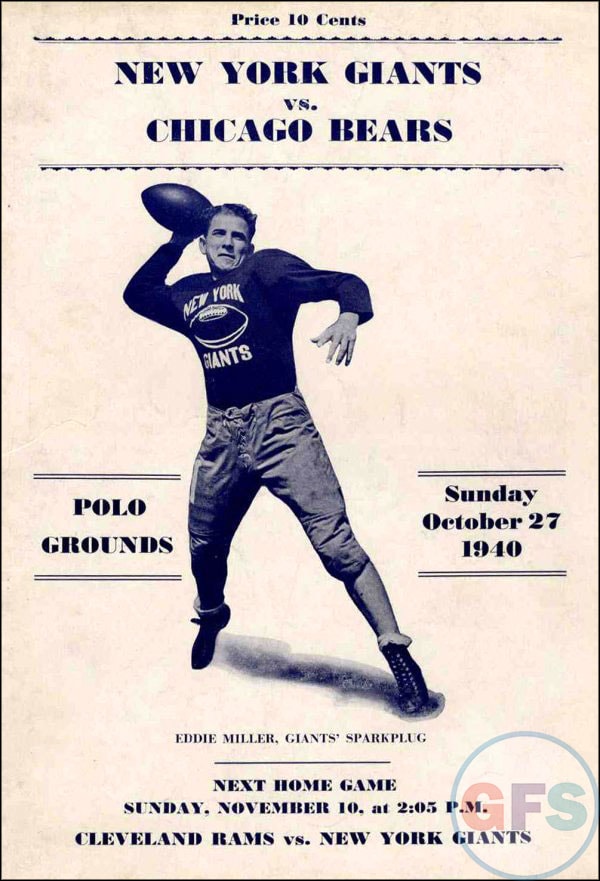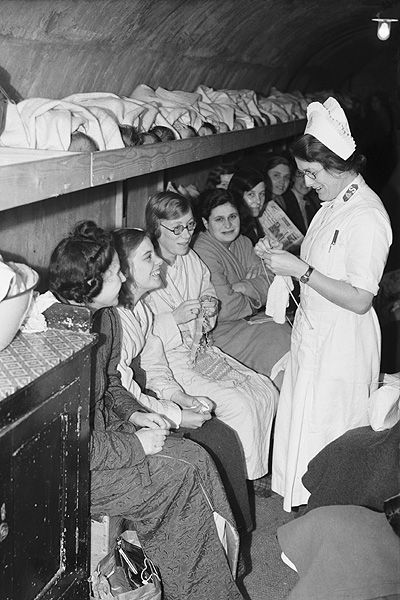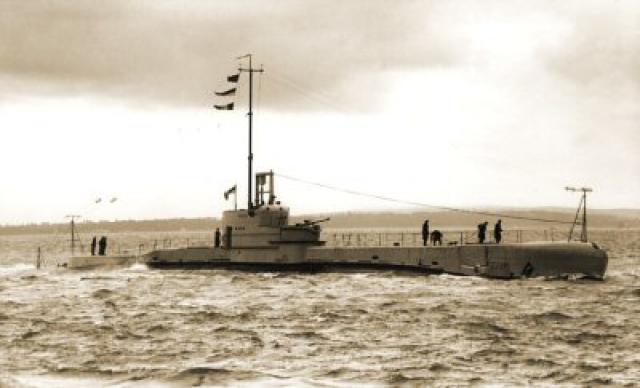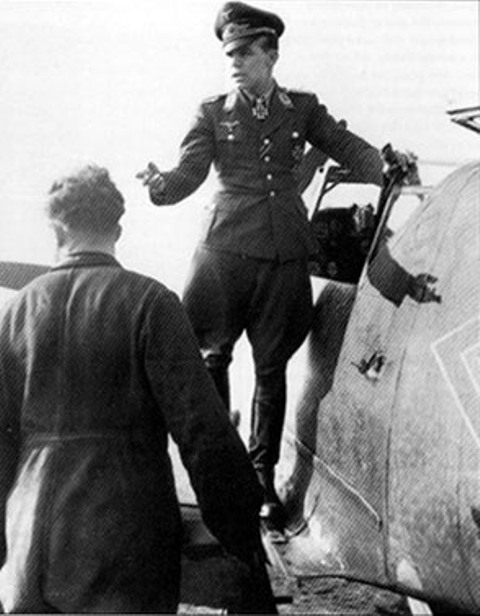Sunday 27 October 1940
 |
| Tommies on patrol in the Western Desert, 27 October 1940. |
The day has low-hanging clouds which allow the planes to battle it out in blinding sunshine, but on the ground, it is dark, drizzly and miserable. For some reason, Fighter Command loses (at least temporarily out of action) several planes today due to running out of fuel. This may be related to the standing patrols that it has begun implementing.
The Jabos start early this morning, coming across in waves beginning around 07:30. The primary targets are the airfields around London (Biggin Hill, Kenley) and the city itself. As usual with the early morning raids, Fighter Command is slow off the mark and makes relatively few interceptions. Both sides take losses.
The first series of raids last for two hours, and another series begins around 11:30. This formation flies high and fast and heads for the London docklands. Two Hurricanes run out of fuel and are forced to crash-land, and a Spitfire is lost at Andover.
Another wave of Jabos crosses around 12:30. Fighter Command is ready and waiting for them and prevents any major damage.
The next wave of attacks is just after lunchtime at 13:30. The Jabos split up after crossing the coast, some heading for Central London, others for points further east. RAF No. 603 Squadron takes a beating in this encounter, losing three planes and two pilots.
The largest raids of the day take place around 16:30. This one includes medium bombers, a rare sight during daylight hours. Junkers Ju 88s, Heinkel He 111s and Dornier Do 17s fly over the Thames Estuary to East Anglia. RAF Martlesham and Coltishall are attacked, but they sustain little significant damage. The medium bombers strafe the airfields to little purpose, and the bombs, including some with delayed action fuses, only lightly damage the facilities.
At the same time, Junkers Ju 88s escorted by fighters attack Southampton and Portsmouth. Both sides claim victories in this attack. Further, but smaller, raids take place beginning around 18:30 against a bunch of RAF airfields: Leconfield, Feltwell, Driffield, Kirton-in-Lindsey, and Martlesham. One of the Junkers is shot down near Driffield, and the men at the base recover one of the MG 15 machine guns for their trophy case. Italian BR 20M bombers participate in an attack on Ramsgate
After dark, the main targets are London, Liverpool, and the Midlands. The London raids are of moderate intensity, and the bombers drop their loads all across the southern part of England without any main target. The LMS railway at Tottenham takes a hit which puts it out of action when a water main bursts. The Luftwaffe also drops mines all along the eastern coast, including Harwich and the Thames estuary.
Losses for the day are about even at roughly a dozen apiece. While the Luftwaffe attacks appear disorganized, they cause a fair amount of damage. The Germans do much better when they do not send their formations over "parade-style" but instead, vary the targets and intensity of their raids. The RAF loses four pilots killed, which is much worse than losing planes.
A Bf 109 shot down today in the marshes near Canterbury - flown by Oblt. Ulrich Steinhilper of I./JG 52 - will be recovered in 1980 for preservation by the Kent Battle of Britain Museum at Hawkinge. Steinhilper himself, who survived the war as a POW in Canada, visits the plane a few years later.
Another plane lost today at Congburn Dean, Edmondsley, a Hurricane of No. 43 Squadron flown by Sergeant L.V. Toogood, is recovered in October 1978. Toogood perished in the crash. This apparently was not a combat crash, but due to some equipment malfunction such as oxygen failure.
Major Hannes Trautloft of JG 54 claims a Spitfire over Ashford.
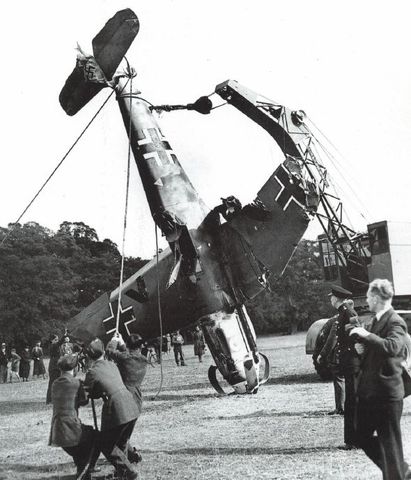 |
| “The Messerschmitt Bf 109 E Oberleutnant Karl Fischer shot down in Windsor Great Park. October 1940.” |
Battle of the Atlantic: British 42k ton troopship Empress of Britain is taken in tow by oceangoing tugs HMS Marauder and HMS Thames around 09:30. They make for the Clyde at 4 knots, covered by destroyers and Short Sunderland flying boats. U-32 (Kptl. Hans Jenisch), directed to the scene by U-boat Command, approaches the British ships during the day but must remain submerged throughout the day due to the British escorts. After dark, he surfaces and locates the stricken liner using hydrophones. Destroyer escorts HMS Broke and Sardonyx are zig-zagging. U-32 maneuvers into position to attack just after midnight.
Italian submarine Nani torpedoes and sinks 1583 ton Swedish freighter Meggie about 130 km off Santa Maria Island, Azores. Everybody aboard survives.
Dutch 325 ton coaster Margaretha hits a mine and sinks in the Bristol Channel near Newport, Monmouthshire. Everybody aboard survives.
British 20 ton drifter Persevere hits a mine and sinks in the Firth of Forth.
British 634 ton coaster Suavity hits a mine and sinks off Hartlepool, County Durham in the North Sea. Everybody aboard survives.
The Luftwaffe damaged 5013-ton British freighter Alfred Jones in Convoy OB 234 in the Irish Sea. There are 12 deaths.
The Luftwaffe also damages 411-ton British freighter Conister and 1556 ton British freighter Newlands.
Royal Navy light cruiser Arethusa collides with freighter Flaminian in the North Sea, slightly damaging its bow.
Royal Navy submarine HMS Swordfish reports damaging a freighter off Cherbourg.
German heavy cruiser Admiral Scheer departs Germany for a raid into the Atlantic, proceeding north along the Norwegian coast.
Convoy OB 235 departs from Liverpool, Convoy FN 321 departs from Southend, Convoy FN 321 departs from Methil, Convoy SL 53 departs from Freetown.
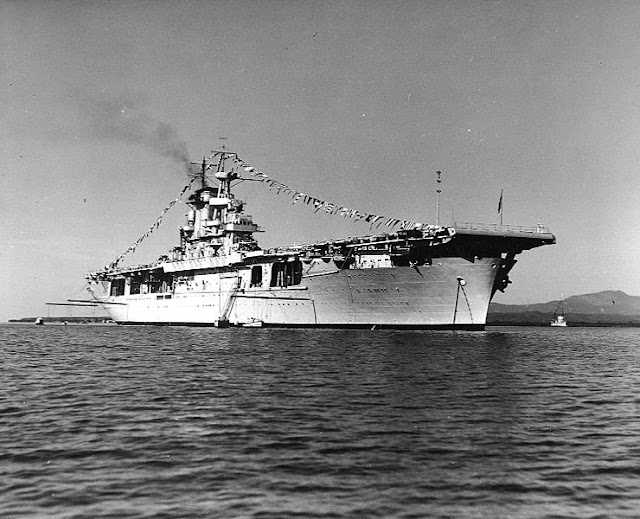 |
| USS Wasp decked out for Navy Day. 27 October 1940. |
Royal Navy aircraft carrier HMS Eagle, on a mission out of Alexandria, launches air attacks against the Italian seaplane base at Maltezana, Rhodes, Greece.
At Malta, there is an air raid around 10:00 which results in a massive dogfight over the island. Eight RAF planes (six Hurricanes, two Gladiators) take on an equal number of Macchi 200 aircraft. There is no bomb damage and both sides take some damage to a plane (the Italian plane may not have made it back).
Spy Stuff: An Enigma intercept puts British fears of an imminent invasion to rest. The German message refers to "training" for the invasion - which means it can't happen any time soon, if at all.
Italian/Greek Relations: Italian ambassador in Athens Emanuele Grazzi peremptorily delivers a demand from Mussolini late in the evening. The note demands that Italian troops be permitted to occupy key points in Greece. Greek dictator Ioannis Metaxas replies:
Alors, c'est la guerre ("Then, it's war").Everybody knows this is tantamount to a declaration of war. Metaxas is fully aware of increasing Italian provocations, such as their air raid on Greece on the 26th, but censors such news from the media.
Metaxas has been mobilizing his own troops in great secrecy and they are dug in along the mountains facing Albania. Mussolini, of course, did not deliver the demand in the expectation that it would lead to anything other than such a refusal. The Greek/Albanian front - the traditional invasion route from Italy for millennia - is full of good defensive positions. It also is an extremely restricted front, with almost no maneuvering room. For the time being, Metaxas can concentrate his entire army there, because the Italians also have to worry about the Royal Navy and thus cannot embark on tenuous amphibious invasions further south. Deep-seated historical enmity guarantees that any conflict between the two countries will be fought with great savagery.
German/Italian Relations: The Germans remain in the dark about Italian intentions toward Greece, and news flows to them sporadically from various sources. German Generalmajor Enno von Rintelen, the liaison with the Italian military, calls the OKW at noon and informs them that it is now "practically certain" that the invasion will take place the next morning. This is the first "confirmation" of when the attack will take place, as Italian Foreign Minister Count Ciano has been uncommunicative. German Foreign Minister Ribbentrop, meanwhile, already is on his train "Heinrich" for the meeting on the 28th with Mussolini in Florence and remains completely out of the loop. General Alfred Jodl, OKW Chief of Operations, reviews the information and informs Hitler that the Italian attack will take place in the morning; Hitler simply accepts the information, issues no instructions, and leaves as scheduled in his train "Amerika" at 18:00 for Florence. If the attack does take place as anticipated, it will be while Hitler is still crossing the Alps in his train. By 21:00, the Italians reveal their plans officially to the Germans.
 |
| Today is Navy Day in the US. Here, the battleship USS Texas shows its colors on 27 October 1940 (US National Archive). |
Free France: In a symbolic exercise, the Free French government officially is established in London. General de Gaulle, in Africa, broadcasts:
As long as the French Government and the representation of the French people do not exist normally and independently of the enemy, the powers formerly performed by the Chief of State and by the Council of Ministers will be exercised by the leader of the Free French forces assisted by a Council of Defense.Albania: The Italians, preparing for their invasion of Greece, order all Jews out of Albania.
American Homefront: The 1939-40 New York World's Fair, which opened in April 1939, closes. A cultural success, it is a financial failure at least in part due to the outbreak of the war in Europe. Many countries have not participated or have withdrawn their participation due to the conflict. The site in Flushing Meadows remains a park to this day and was later used for the 1964-65 World's Fair, which obliterated the remnants of the earlier fair but used the same basic geography. The monuments leftover from the latter remain clearly visible to travelers on the nearby New York highways. Little is left of the 1939-40 Fair, however, which most people consider having been more historically significant and a classier affair. The site, incidentally, also will be used briefly as the first home of the United Nations.
Future History: John Joseph Gotti, Jr. is born in the Bronx, New York. Born in poverty, he rises through the ranks of organized crime and becomes the boss of the Gambino crime family. He ultimately is convicted of five murders and numerous other crimes. He dies in prison on 10 June 2002.
 |
| Frieda Siegel (Miss Brooklyn) at the Fair. The Crosley Pavilion and Trylon and Perisphere can be seen in the background. |
October 2, 1940: Hitler's Polish Plans
October 3, 1940: British Cabinet Shakeup
October 4, 1940: Brenner Pass Meeting
October 5, 1940: Mussolini Alters Strategy
October 6, 1940: Iron Guard Marches
October 7, 1940: McCollum Memo
October 8, 1940: Germans in Romania
October 9, 1940: John Lennon Arrives
October 10, 1940: Führer-Sofortprogramm
October 11, 1940: E-Boats Attack!
October 12, 1940: Sealion Cancelled
October 13, 1940: New World Order
October 14, 1940: Balham Tragedy
October 15, 1940: Mussolini Targets Greece
October 16, 1940: Japanese Seek Oil
October 17, 1940: RAF Shakeup
October 18, 1940: Convoy SC-7 Catastrophe
October 19, 1940: Convoy HX-79 Catastrophe
October 20, 1940: Convoy OB-229 Disaster
October 21, 1940: This Evil Man Hitler
October 22, 1940: Aktion Wagner-Burckel
October 23, 1940: Hitler at Hendaye
October 24, 1940: Hitler and Petain
October 25, 1940: Petain Woos Churchill
October 26, 1940: Empress of Britain Attack
October 27, 1940: Greece Rejects Italian Demands
October 28, 1940: Oxi Day
October 29, 1940: US Draft Begins
October 30, 1940: RAF Area Bombing Authorized
October 31, 1940: End of Battle of Britain
2020
